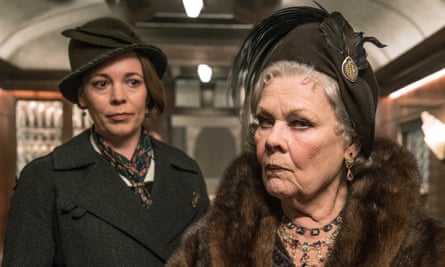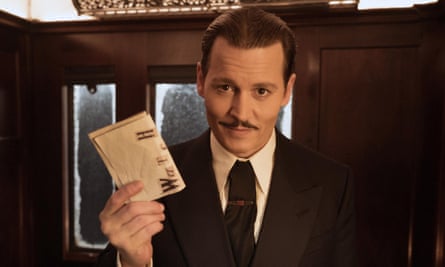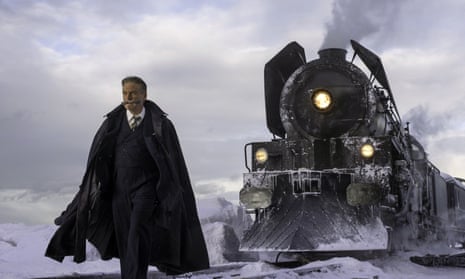The word “sheer” is missing from the beginning of the title. Like a dusty and long-locked display room in Madame Tussauds, this movie showcases an all-star cast in period costume, each of whom must suppress his or her star quality in the cause of being part of an all-star cast. It is a new version of Agatha Christie’s 1934 detective mystery, one of her most ingenious, all about a grisly killing on board a train that is marooned in snow. The story arguably has something to say about the nature of guilt and the nature of authorship. Kenneth Branagh directs and plays the legendary Belgian sleuth Hercule Poirot with an unfeasibly large ’tache, accessorised with a demi-goatee beneath the lower lip and a pepper-and-salt colouring overall, like the hair of former ITV World of Sport presenter Dickie Davies. Poirot says things like: “The keelaire eez meurking me!”
The film’s old-fashioned luxury stylings pay homage to Sidney Lumet’s own A-lister-crammed version from 1974 – which had Albert Finney as a more dyspeptic and glowering Poirot – and the film seems to be testing the waters for a lucrative new Bond-style franchise, the next caper being Death on the Nile. This Murder on the Orient Express gives the story a slightly more modern perspective; some of the races are changed and the era’s attitudes challenged, although there is a smug gag about a cheery prostitute at the beginning that could come straight from the seedy-sophisticate 70s. Two characters oddly allude to an earnest argument they have supposedly had about “Stalinism” in which it is far from obvious who is for and who against.

This version also tries to open things out a little by creating some derring-do out there in the freezing snow, before people nip smartly back into the warm carriage. There’s some outrageous product placement for a certain brand of chocolate, prominently displayed, over which Poirot lingers to say: “Ah leurve these leeteurl cecks!” (However much they contributed to the production budget, it wasn’t enough.)
Poirot boards the renowned Orient Express in Istanbul, heading for Calais, and finds he is sharing it with a remarkable cross-section of American and European society – though, with only a dozen or so passengers, the real mystery is how the Orient Express stays solvent. There is the haughty and cantankerous White Russian Princess Dragomiroff (Judi Dench) and her submissive maid Hildegarde Schmidt (Olivia Colman); demure governess Mary Debenham (Daisy Ridley), who may have some connection with Dr Arbuthnot (Leslie Odom Jr); sinister German academic Gerhard Hardman (Willem Dafoe); a mousily religious Pilar Estravados (Penélope Cruz); manhunting American widow Mrs Hubbard (Michelle Pfeiffer); saturnine Russian dancer Count Andrenyi (played by real-life ballet star Sergei Polunin) and his troubled wife, Countess Andrenyi (Lucy Boynton); and genial businessman Marquez (Manuel Garcia-Rulfo). There is also a crooked American art dealer, Ratchett (Johnny Depp), accompanied by his butler, Masterman (Derek Jacobi), and private secretary, Hector MacQueen (Josh Gad). One of these people is found murdered – subject to a frenzied stabbing.
What a mouthwatering cast it looks. And yet, of all these characters, only one is given anything like the necessary space to live and breathe, and that is the malign, gravel-voiced Ratchett. He has an interestingly charged scene with Mrs Hubbard and a similarly fraught encounter with Poirot, in which he has the unthinkable bad taste to offer the great detective a job.

Tellingly, these moments happen before the murder, the discovery of which is filmed in the most bafflingly indirect way. Branagh contrives a showy overhead shot of the tops of people’s heads as they break into the victim’s compartment and the shock factor of unveiling the bloody corpse is lost, with nothing much gained in terms of subtlety or indirect revelation.
When the murder is announced, the narrative clockwork is assumed to have been set in motion. And yet it is more like the victim’s pocket watch, which was smashed in the violence and ceased to work, thus giving Poirot a vital clue as to the time of death. Something about the story itself goes dead at that moment, reviving only with the big reveal at the end, for which Poirot assembles the suspects outside, all seated at some sort of last-supper trestle table. Carrying that thing around on the train must have been a pain, but at last it came in handy. This film never gets up a head of steam.
- This article was amended on 3 November to correct the title of Agatha Christie’s book Death on the Nile, which had been mistakenly referred to as Murder on the Nile

Comments (…)
Sign in or create your Guardian account to join the discussion